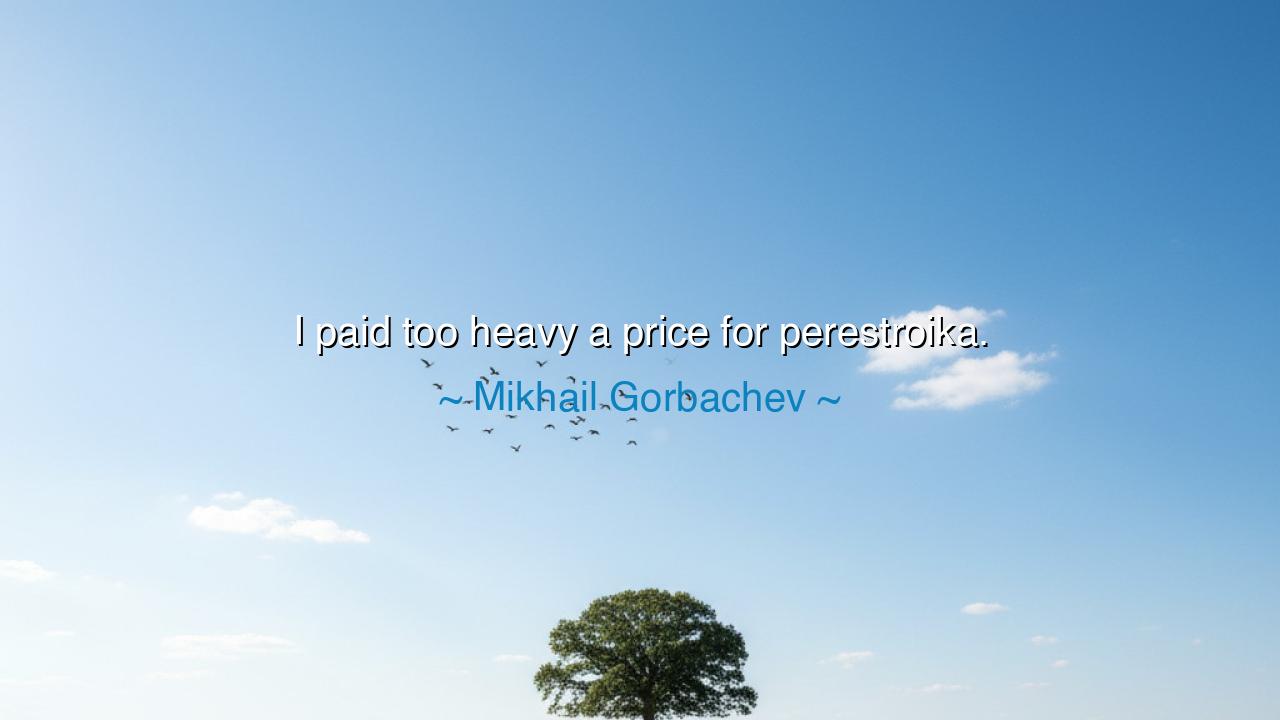
I paid too heavy a price for perestroika.






The words of Mikhail Gorbachev fall like the sigh of a man who bore the weight of history: “I paid too heavy a price for perestroika.” This saying is born from the ruins of an empire, from the dreams of reform that shook the pillars of the Soviet Union. To the unknowing, perestroika—meaning “restructuring”—was a call to renewal, to open the windows of a stagnant order and let in the winds of freedom. Yet for Gorbachev, the architect of this daring vision, the cost was not only the collapse of a state but the loss of his own power, his name forever bound to both hope and ruin.
The ancients would have called such a man tragic, like Oedipus or Prometheus, who sought light but was consumed by the fire he carried. Gorbachev believed that to change the course of history, one must loosen the chains of tyranny, grant speech to the silenced, and allow breath to a system suffocating under its own weight. But the paradox of reform is that once begun, it cannot be contained. The people demanded more than he could give; the empire fractured faster than he could bind it. Thus, the price he paid was not only his throne, but the very order he sought to save.
Consider the tale of 1989, when the Iron Curtain fell across Europe. In East Germany, Hungary, Poland, and beyond, nations broke free, emboldened by Gorbachev’s refusal to send tanks to crush their uprisings. To the world, he became a hero of peace, the man who ended the Cold War without fire or blood. Yet to many in his homeland, he was branded a destroyer, the one who presided over economic hardship, chaos, and the dissolution of the Soviet Union. His legacy was both glory and grief, woven together as tightly as threads in a single cloth.
The meaning of his words is therefore clear: great visions demand great sacrifices, and those who lead revolutions often fall beneath their weight. Perestroika opened the door to freedom for millions, but it left its maker cast aside, misunderstood by those he sought to serve. It is the ancient lesson of leadership—that those who dare to reshape the world must often surrender their own place within it.
Let the generations remember: true reformers are rarely crowned in their own time. They are the ones who plant trees under whose shade they will never sit. Gorbachev’s lament is not the cry of failure, but the voice of a man who bore the wounds of history so that others might breathe freer air. His price was heavy, but his gift was vast, a reminder that sometimes the burden of one life redeems the destiny of many.






AKNguyen Cat Anh Khoi
The cost of perestroika, as Gorbachev sees it, seems to have been more than just political or economic—it seems deeply personal. His reforms triggered a collapse that affected not only the Soviet state but also millions of lives. Was this price inevitable, or could the transition to a more open society have been managed differently? How does this reflect the larger struggle between idealism and the harsh realities of political change?
TTrang
Gorbachev’s statement highlights a deep sense of regret for the consequences of perestroika. While many argue that it was necessary for the eventual end of the Cold War, the price of reform seems to have been felt personally and politically. How should we view his legacy in light of this statement? Is it possible to separate the good intentions of reforms from their unforeseen and often destructive outcomes?
HPHuong Pham
This quote makes me think about how difficult it is to enact change, especially on such a grand scale as perestroika. Gorbachev’s admission suggests regret or perhaps a sense of loss for the political and social upheaval that followed. Was the outcome worth the cost, or did the reforms ultimately do more harm than good? Could the Soviet Union have modernized without facing such a high price?
GDGold D.dragon
Gorbachev’s reflection on perestroika shows the immense cost of political reform. While it was meant to modernize the Soviet Union, the consequences were far-reaching and painful. Did Gorbachev underestimate the backlash that his reforms would trigger? Or is this simply a recognition that no major change comes without sacrifice? What do we learn from this in terms of balancing progress with the price it demands from those who initiate it?